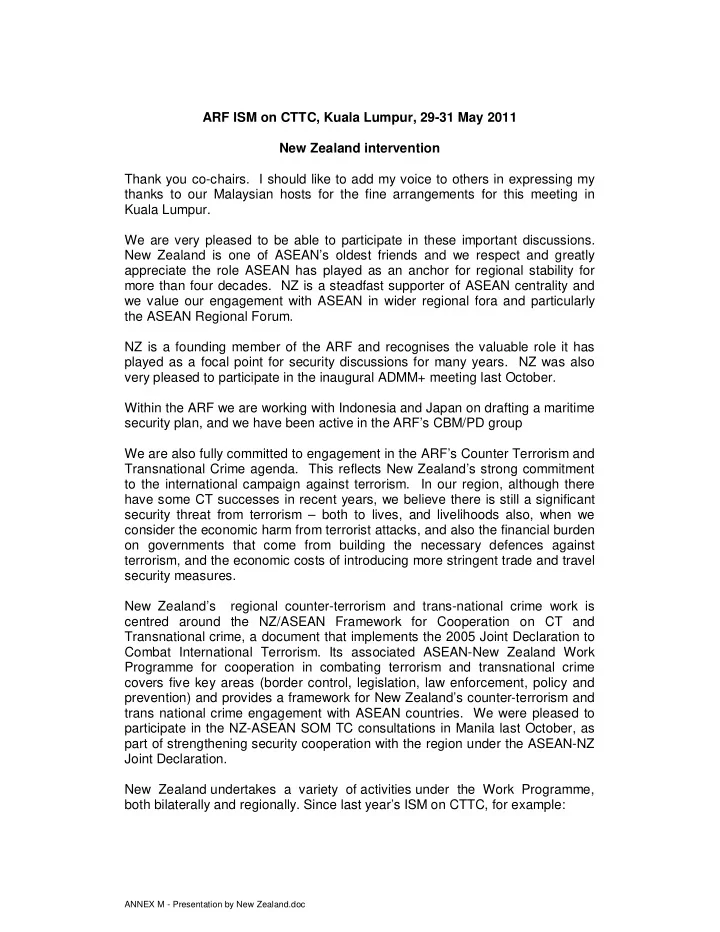

ARF ISM on CTTC, Kuala Lumpur, 29-31 May 2011 New Zealand intervention Thank you co-chairs. I should like to add my voice to others in expressing my thanks to our Malaysian hosts for the fine arrangements for this meeting in Kuala Lumpur. We are very pleased to be able to participate in these important discussions. New Zealand is one of ASEAN’s oldest friends and we respect and greatly appreciate the role ASEAN has played as an anchor for regional stability for more than four decades. NZ is a steadfast supporter of ASEAN centrality and we value our engagement with ASEAN in wider regional fora and particularly the ASEAN Regional Forum. NZ is a founding member of the ARF and recognises the valuable role it has played as a focal point for security discussions for many years. NZ was also very pleased to participate in the inaugural ADMM+ meeting last October. Within the ARF we are working with Indonesia and Japan on drafting a maritime security plan, and we have been active in the ARF’s CBM/PD group We are also fully committed to engagement in the ARF’s Counter Terrorism and Transnational Crime agenda. This reflects New Zealand’s strong commitment to the international campaign against terrorism. In our region, although there have some CT successes in recent years, we believe there is still a significant security threat from terrorism – both to lives, and livelihoods also, when we consider the economic harm from terrorist attacks, and also the financial burden on governments that come from building the necessary defences against terrorism, and the economic costs of introducing more stringent trade and travel security measures. New Zealand’s regional counter-terrorism and trans-national crime work is centred around the NZ/ASEAN Framework for Cooperation on CT and Transnational crime, a document that implements the 2005 Joint Declaration to Combat International Terrorism. Its associated ASEAN-New Zealand Work Programme for cooperation in combating terrorism and transnational crime covers five key areas (border control, legislation, law enforcement, policy and prevention) and provides a framework for New Zealand’s counter-terrorism and trans national crime engagement with ASEAN countries. We were pleased to participate in the NZ-ASEAN SOM TC consultations in Manila last October, as part of strengthening security cooperation with the region under the ASEAN-NZ Joint Declaration. New Zealand undertakes a variety of activities under the Work Programme, both bilaterally and regionally. Since last year’s ISM on CTTC, for example: ANNEX M - Presentation by New Zealand.doc
2 In the border control area, we have provided assistance in aviation security training in the Philippines, to build on the earlier- organised regional aviation security course we supported, with the UK, at SEARCCT here in KL. In the area of legislation and law enforcement, NZ has worked with all three of SE Asia’s regional CT training centres on courses such as crime scene investigation and prosecution, and post-blast explosives analysis. Along with UNODC, NZ is supporting a regional workshop on improving collaboration between police and prosecutors in the prosecution of terrorists at SEARCCT next month. We have also extended this work bilaterally; for example we have provided a Counter-Terrorism scene- investigation course in Hanoi, in December 2010, and we have also provided trainers to take part in the Model Police Station Project being undertaken in the Philippines. In the area of terrorist financing, In South Asia New Zealand supports the work of the Asia Pacific Group on Money Laundering (APG) to help counter the financing of terrorism. New Zealand provided expertise for a workshop on countering the financing of nuclear terrorism, organised by CTED, and New Zealand also provided funding support and expertise towards a recent CTED workshop on "Preventing the Abuse of the Non- Profit Sector to Finance Terrorism". In recognition of the major threat that the internet poses in relation to the organisation of terrorism and international crime, New Zealand is supporting an ASEAN-wide cyber-crime workshop in Singapore, which will take place in June. New Zealand is also active bilaterally with SE Asian partners with targeted CT cooperation activities. At the softer end of the spectrum, NZ has supported a range of initiatives aimed at countering extremist messages and recruitment into terrorism, in support of international recognition that efforts to counter terrorism should fence the top of the cliff, not just park the ambulance at the bottom. On the transnational crime front more broadly New Zealand, along with Australia, is supporting a regional UNODC project that will aim to describe the nature and scale of transnational organized crime – the criminal flows of people, drugs, resources and products - in the East Asia and Pacific region. The Transnational Organized Crime Threat Assessment for East Asia and the Pacific - TOCTA EAP will build on the work UNODC completed in 2010 in its Global Transnational Organized Crime Threat Assessment ANNEX M - Presentation by New Zealand.doc
3 In closing, I would note that terrorist threat continues to evolve and adapt, and that it will continue to pose risks in our region and beyond. New Zealand will continue actively to support CT work, particularly through capacity building and support in our region, bilaterally and regionally, and we look forward to our discussions on how we can work together to address this serious issue. ANNEX M - Presentation by New Zealand.doc
4 [Domestically we are strengthening our counter-terrorism regime. We are currently working to ratify the four of the 16 international counter-terrorism instruments to which New Zealand is not yet party – two of which concern maritime terrorism, and two, nuclear terrorism. In 2010 we also carried out our first national designations/proscriptions of non-UN listed terrorist entities- we have currently listed 14 entities with a further 6 entities pending.] ANNEX M - Presentation by New Zealand.doc
Recommend
More recommend